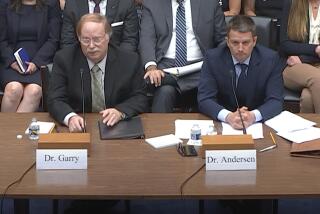Tobacco Witness Contradicts Execs’ Testimony
- Share via
ST. PAUL, Minn. — Less than two weeks after tobacco chief executives told Congress that nicotine is addictive, a top industry spokesman testifying in Minnesota’s anti-tobacco trial disputed whether industry leaders had made that admission.
“I don’t believe they testified that nicotine is addictive,” Walker Merryman, vice president and chief spokesman for the Tobacco Institute, told jurors in the landmark tobacco case, which began its fourth week Monday.
Pressed by Michael Ciresi, lead attorney for the state, to acknowledge the admission, Merryman reiterated: “I don’t recall that they testified that nicotine was addictive.”
The exchange highlighted the industry’s attempts to play different cards with different audiences as it struggles simultaneously to fight this case and win legal protections from Congress. Top executives, eager to sell Congress on a proposed $368.5-billion settlement that would avoid massive trials like Minnesota’s, have sought to appear cooperative and contrite.
But in the Minnesota trial and similar cases pending in nearly 40 other states, the industry is still denying its products are addictive as it seeks to avoid liability for smoking-related health-care costs.
Even so, Merryman’s testimony on the subject stunned some journalists and others attending the trial. The testimony of the chief executives Jan. 29 before the House Commerce Committee made headlines nationwide because it was the first time industry leaders had acknowledged in a public forum that nicotine is addictive.
The heads of four companies--Philip Morris Cos., R.J. Reynolds Tobacco Co., Lorillard Inc., and U.S. Tobacco Co.--all testified this is so under current definitions of addiction. Only the CEO of Brown & Williamson Tobacco Corp. disagreed with that position.
At a recess, however, David Bernick, one of the industry’s lead attorneys, defended Merryman’s accuracy and said a transcript of the congressional hearing would confirm he was right.
According to the transcript, when asked if nicotine is addictive, Steven F. Goldstone, CEO of RJR Nabisco Inc., replied: “Yes, I think under the way people use the term today, I agree, it is.”
Vincent A. Gierer Jr. of UST, said: “I think under some definitions today that would be accurate.”
Laurence A. Tisch of Loews Corp., parent of Lorillard, said: “Under the definition that you are using today, I gather, it would be addictive.”
And Philip Morris’ Geoffrey Bible said that “nicotine found in cigarette smoke has mild pharmacological effect and . . . under some definitions cigarette smoking is addictive.”
Nicholas G. Brooks of B&W; alone said that addiction “is not a term I’d use in relation to cigarette smoking. I know the rest of the world does.”
Merryman, 50, who began his testimony on Friday, was pressed relentlessly about numerous internal documents that suggested that industry pronouncements on the risks of smoking and marketing to kids were at odds with the truth.
Merryman, who had testified that he quit smoking a year and a half ago after a heart attack and bypass surgery, complained of not feeling well and left the witness stand Monday afternoon without completing his testimony. But before his testimony was interrupted, he and Ciresi had this exchange:
Ciresi: “As long as you got paid year after year, you did exactly what they told you to say, is that right?”
Merryman: “Certainly, as an employee, I would be expected to do what’s instructed.”
Ciresi: “Do what’s instructed, and that’s what you’ve done?”
Merryman: “Yes sir, and honorably.”
In another development that underscored the linkage between the trial and congressional debate on the tobacco truce, industry lawyers petitioned Judge Kenneth J. Fitzpatrick to make public an immense trove of internal documents being stored in a Minneapolis warehouse.
The tobacco companies have provided some 33 million pages of documents to lawyers for the state. Most are being stored locally, although about 5 million pages are in a second depository in Guildford, England.
Put in one pile, the Minnesota documents would reach almost two miles skyward, and logistics of how congressional staffers or others might find their way through the mountain of papers have not been worked out.
But in seeking to make the papers available, cigarette makers are trying to neutralize one of the arguments against the tobacco deal--namely, that until all internal documents are disclosed lawmakers will not know the extent of industry misconduct and whether legal relief is justified.
In their recent congressional appearance, the tobacco CEOs offered access to the papers, and followed through with the petition to Fitzpatrick. Lawyers for the state have voiced no objections, and the judge is expected to grant the request this week.
But tobacco foes, including Minnesota Atty. Gen. Hubert Humphrey III, called the request a public relations ploy. Humphrey noted that the most incendiary documents will become public anyway as lawyers for the state introduce them in court. The industry “is only agreeing to release documents that we are already exposing in our trial,” he said.
More to Read
Sign up for Essential California
The most important California stories and recommendations in your inbox every morning.
You may occasionally receive promotional content from the Los Angeles Times.












